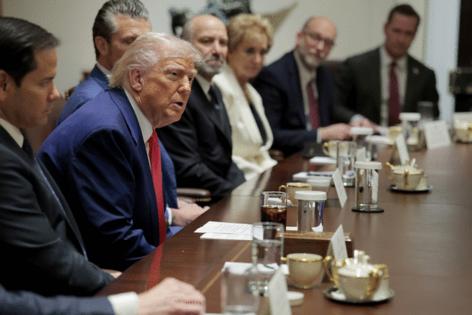State and local business leaders gather to talk tariff impacts, future of Texas trade
Published in News & Features
One topic is dominating the minds of Fort Worth’s business leaders this week — tariffs.
New tariffs imposed on almost every country in the world by the Trump administration last week have the region’s business owners concerned.
Tariffs on all countries except China were paused for 90 days Wednesday. The bevy of recently imposed duties has upended global stock markets since being imposed April 2, dubbed “Liberation Day” by President Donald Trump. Texas, home to one of the world’s largest oil and gas industries, has also been caught in the trade war’s fray.
Business leaders expressed their concerns over the uncertain future of tariffs at an event hosted by the Fort Worth Chamber of Commerce on Thursday night. Held at the rooftop bar of the Hyatt Place Fort Worth/TCU, President and CEO of the Texas Association of Business Glenn Hamer led the discussion.
Hamer said that no active members of the business community have ever seen this type of tariff activity. The last landmark tariffs were imposed in 1930 when the Smoot-Halwey Tariff Act became law, a move that worsened the Great Depression.
He described the term tariff as a “polite” word for what’s happening.
“It’s a tax. We pay it, we’re going to pay it,” Hamer said. “We’re going to start paying it any second now, on a lot of the electronic equipment that’s coming from China, a lot of the apparel stuff that’s coming from abroad, we’re going to pay it.”
Hamer said that if tariffs result in reduced barriers to trade, Texas could benefit from being able to sell more goods. The next 30 days will be a crucial test of federal officials’ ability to negotiate new trade deals with the country’s top trading partners, Hamer said. The Texas Association of Business, the state’s chamber of commerce, is supportive of trade.
“We win with trade in Texas,” Hamer said.
Tariffs on Chinese imports totaled 145% by Thursday evening. Hamer acknowledged the disproportionate effect those tariffs could have on small businesses.
“A lot of larger businesses can change, and they can redirect supply chain. For a small business that’s asked to absorb a massive new cost, that could be different,” Hamer said.
Texas imported about $142.7 billion of goods from Mexico in 2023, according to the state’s economic development and tourism office. Roughly $51.9 billion of Texas’ exports that year came from the Metroplex. The state’s exports totaled over $455 billion in 2024, more than any other state.
Hamer is optimistic that Texas’ role as the country’s top exporting state means it will be a part of conversations about tariff policies.
“We are the blueprint for how to have a successful economy. Our voice in trade is going to be incredibly important,” Hamer said. “I do think the president, the administration, will listen to the voices of Texas businesses.”
Hamer said the country must decide what its regulatory climate and tax policy will look like going forward to provide the business community with some sense of certainty. The Trump administration has yet to extend the Tax Cuts and Jobs Act of 2017, some provisions of which expire at the end of the year.
In November, Hamer told the Star-Telegram he believed that Trump’s re-election would accelerate Texas’ economic growth. At Thursday’s event, he said it’s the business community’s responsibility to support the Trump administration’s successes and push back when its policies aren’t in the country’s best interest.
“There is a way to improve the world trading system, but indiscriminately tariffing everyone, friend and foe, and driving potentially countries into, say, the orbit of China, would be a disaster for the United States,” Hamer said.
©2025 Fort Worth Star-Telegram. Visit at star-telegram.com Distributed by Tribune Content Agency, LLC.







Comments